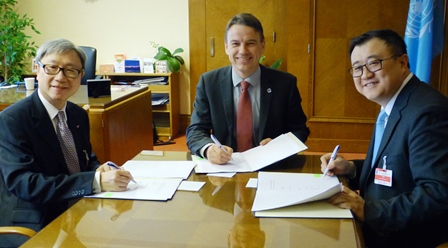
China’s ‘One Belt, One Road’ initiative, aimed at improving the connectivity between China and Europe along the ancient Silk Road as well by sea, will require massive investments in infrastructure. This will considerably improve infrastructure in both China and in neighbouring countries. Public-Private Partnerships (PPPs) are expected to play a key role in mobilizing the resources needed for these investments.
At the same time, a number of conditions need to be met in order for PPPs to deliver their full potential:
- A robust legal framework;
- Improved coordination of economic and infrastructure policy by participating countries;
- Commitment to open markets and policy predictability;
- Favourable financial system conditions including stability and currency policy; and
- An enhanced capability in governments– both local and national - to prepare infrastructure projects that both fulfill public service needs and are attractive to private sector investors.
In order to facilitate the efficient use of PPPs for the ‘One Belt, One Road’ initiative, UNECE and the Government of China are joining forces to establish an international PPP Centre of Excellence that will be jointly hosted by Tsinghua University in Beijing and City University in Hong Kong. This Centre will be in charge of developing international best practices in PPP in the field of Transport Logistics.
This cooperation has been formalized by the signing of a Memorandum of Understanding (MoU) by Christian Friis Bach, UNECE Executive Secretary and Minister Shaoshi Xu, Chairman, National Development and Reform Commission (NDRC), and today the final step was taken with the signing of a more detailed MoU focussed on the Centre with officials from Tsinghua University (Beijing) and City University (Hong Kong).
At this signing, Christian Friis Bach said: “The development of international standards and best practices for Public-Private Partnerships in the Transport sector will help countries along the historic Silk Road, and also globally, to attract investments in much needed infrastructure. The UNECE also looks forward to cooperating with China on developing PPP standards and on transport and trade facilitation procedures to support the ‘One Belt, One Road’ initiative ”.
Tianyi Wang, one of the key initiators of PPPs in China, said “By working closely with the UNECE, we are looking forward to joining a global network of representatives from the public and private sectors developing PPP standards, and to contributing Chinese expertise and perspectives to this process. These standards will help develop infrastructure under the ‘One Belt, One Road’ initiative and will also be beneficial to China’s internal PPP programme.”
The first action to take place within this partnership will be a training session on UNECE’s PPP best practices and standards that will take place in Shenzen, China – where several hundred Government officials will receive orientation in PPPs for the first time. This training programme will assist China’s civil servants to prepare bankable projects and viable PPP project pipelines. The cooperation also includes a pilot PPP programme in Qingdao City.

